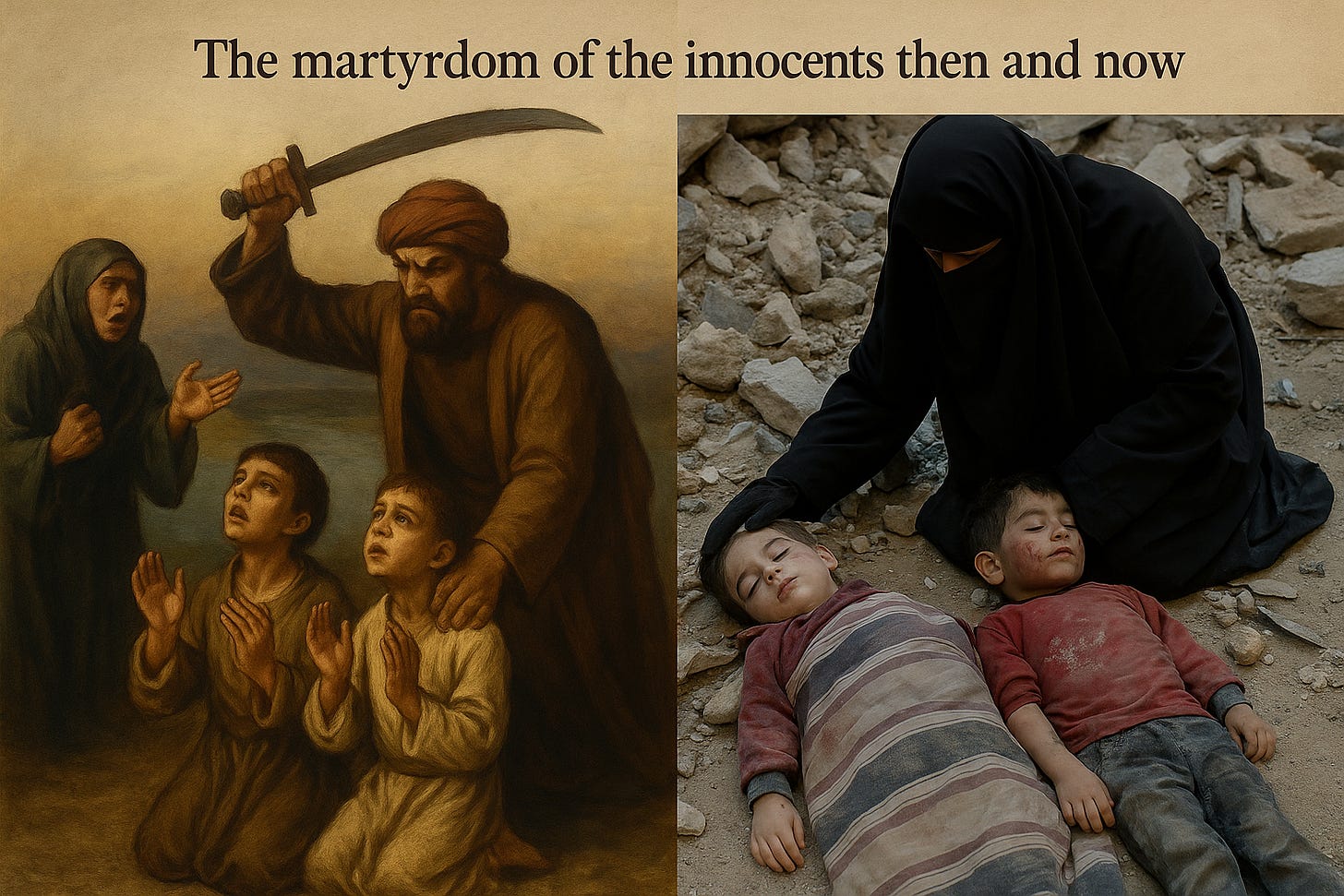The Martyrdom Of The Innocents Then And Now
“From the Rivers of Kufa to the Rubble of Gaza: The Unchanging Fate of Innocent Blood in the Face of Tyranny”
After the tragic and cruel death of Muslim in the year 60 Hijra.Muslim son of Aqeel left two sons who were helped to escape and were safely hidden from harm by the compassionate wife of Harith. However, Harith himself was a heartless man. When he discovered the boys in his house and learned who they were, his reaction was anything but merciful.
Overcome with greed and cruelty, he exclaimed with joy,
“I’ve been searching for you all day, and here you are—in my own house!”
He stormed into the room, dragged the two frightened boys out of their beds, and tied them to a pillar. His wife, desperate to protect them, tried to stop him—but he beat her mercilessly. Harith was determined to collect the reward offered by Ubayd Allah ibn Ziyad for capturing the children.
That night, the boys remained tied to the pillar. In the morning, Harith dragged them to the riverbank. His wife followed them, still pleading for their lives. When Harith raised his sword, the children cried out to the woman, calling her “Mother dear!” Her heart shattered, and she continued to beg for mercy. But the brute ignored her cries.
As Harith prepared to strike, she ran to intervene—but he severed both her hands with a swing of his sword.
The elder boy, Ibraheem, asked, “Harith, are you going to kill us?”
“Yes,” Harith replied coldly.
“In that case,” said Ibraheem, “give us time to finish our morning prayers.”
The two boys prayed with unwavering faith. Then they raised their hands and cried,
“Inna Lillahi wa Inna Ilayhi Raji’oon. O God, we are coming to You. Give our mother strength when she hears of our death, and judge between us and our killers.”
As they finished their prayer, Harith approached them. The elder brother pleaded,
“O man! Do not behead my younger brother before me. When we parted from our mother, she entrusted him to me. Please, behead me first.”
Harith granted this final request. With one strike, he severed the head of the elder child and threw his body into the river. Then he did the same to the younger brother. It is said that the elder’s body remained still in the water until the younger’s joined it—then both floated away together.
Harith washed the blood from their heads and faces, wrapped them in a cloth, and went to meet Ubayd Allah ibn Ziyad in Kufa. Ubayd Allah sat on his throne with an heirloom in his hand, surrounded by his court. Harith approached, bowed, and placed the bundle before him. When he unwrapped it, revealing the two innocent heads, the crowd stood in shocked silence.
He looked at Harith and asked, “While you were killing them, did they say anything?”
“Yes,” replied Harith. “They begged me not to kill them for the sake of the Holy Prophet. They asked me to sell them into slavery or bring them to you alive. They reminded me they were just children and pleaded for mercy. But I told them I had no soft heart. I only granted one wish: to allow them to pray two rak’at.”
Ubayd Allah leaned forward. “What did they say in their prayer?”
Harith shrugged. “Nothing important.”
“Tell me exactly what they said,” Ubayd Allah insisted.
“They said: ‘O the Ever-Living, O the Self-Subsisting, O the Forbearing One, O the Wise, O the Best of Judges—You Yourself judge between this man and us.’”
On hearing this, Ubayd Allah stood, struck Harith on the head with his heirloom, and shouted, “
That prayer is indeed important! It is powerful—and their prayers have surely been answered!”
He called to his executioner, “Oh Jallad, come forward!”
A strong man stepped forward, masked and armed. “At your service, master.”
“Take this man to the very place where he killed those children, and execute him. But ensure his filthy blood does not mingle with their pure blood. Now go!”
Harith turned pale and trembled with fear. He begged for mercy. “Please, Ubayd Allah ibn Ziyad, I did this to please you. Have mercy on my wife and children!”
Ubayd Allah answered coldly, “You and I are alike—God has not placed a drop of mercy in our hearts.”
Harith was dragged away to face the justice he had so cruelly denied to others.
Fast forward to the present day, and we still witness agents of corruption and the enemies of truth committing unspeakable atrocities against innocent children—just as Harith did. Perhaps they too hope for reward or recognition. But they forget the clear warning from the Qur’an:
“That is why We ordained for the Children of Israel that whoever takes a life—unless as a punishment for murder or mischief in the land—it will be as if they killed all of humanity; and whoever saves a life, it will be as if they saved all of humanity…”
— Qur’an, Surah al-Ma’idah, Chapter 5, The Table Spread, Verse 32
Let those who support such crimes or remain silent in the face of injustice take heed. As history has shown, even among criminals, betrayal and retribution are inevitable. Harith thought he was serving a master, yet even that master turned against him.
As we approach Arbaeen, let us reflect:
Whose side are we truly on?
Do we defend the innocent—or remain silent in comfort and fear?


